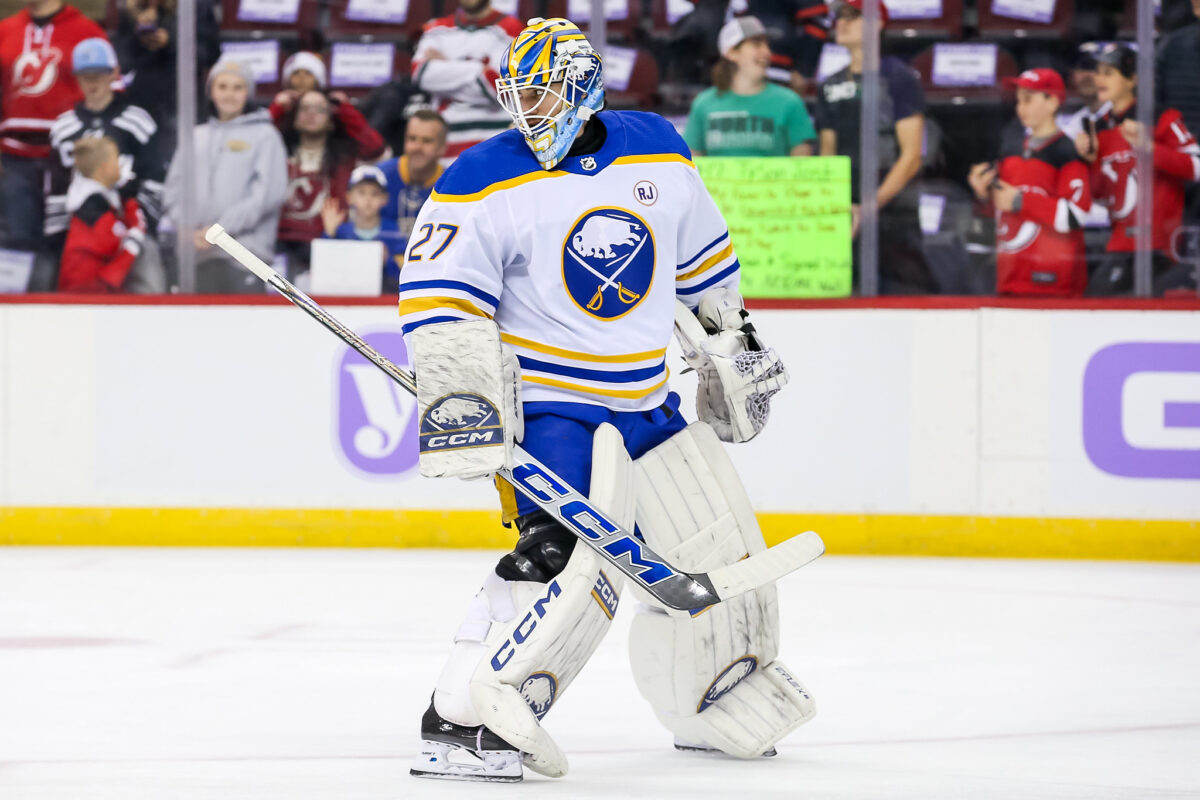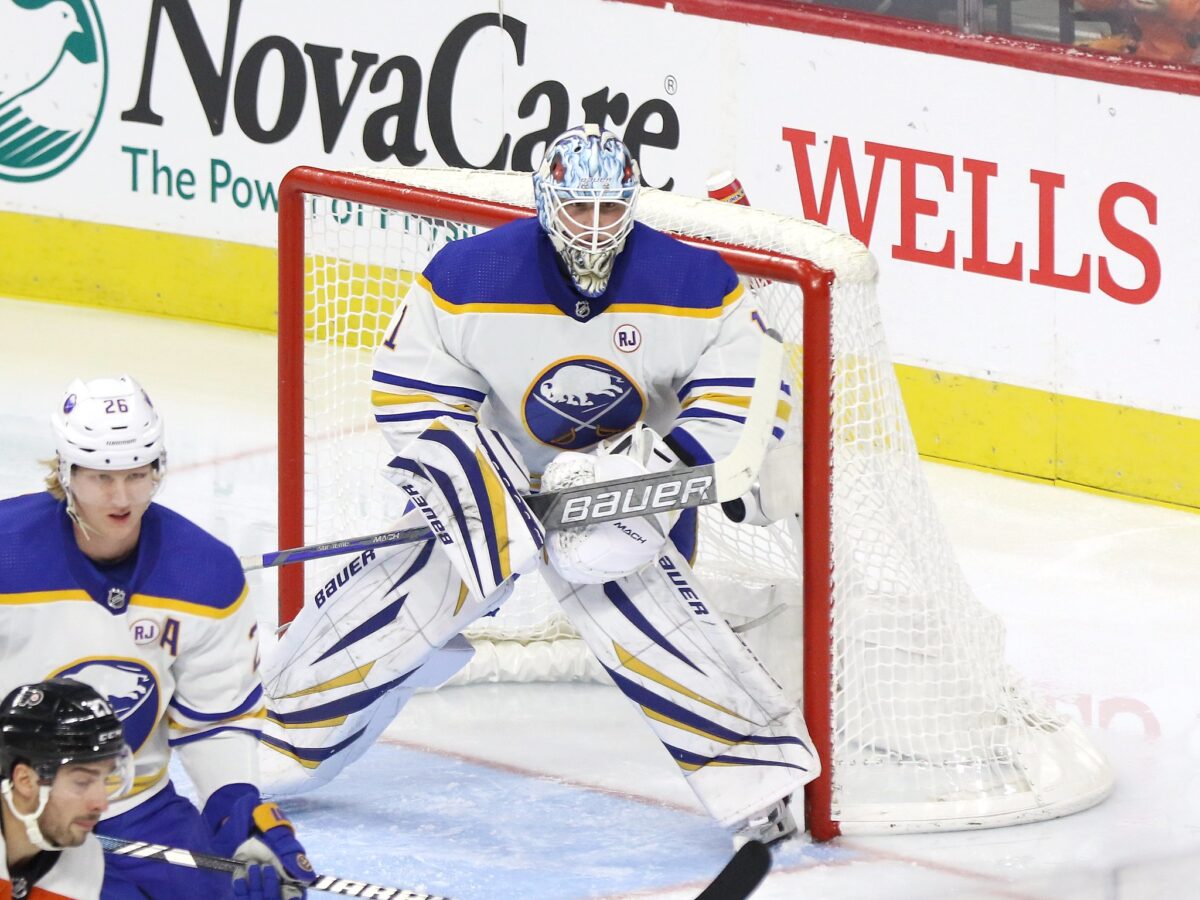Since he debuted at the end of last season, Devon Levi has been the center of attention for the Buffalo Sabres. The hype for him has been through the roof and fans are desperately hoping that he’ll be the solution to the woes the team has endured in goal since Ryan Miller’s departure nearly 10 years ago.
The Sabres rolled the dice before the season when head coach Don Granato named Levi their starting goaltender, but to this point the results haven’t been as expected in spite of the promise he continues to show. With the calendar approaching December, the team was forced to make a change and on Tuesday they announced that Levi was loaned to the Rochester Americans of the American Hockey League (AHL).
It’s unclear if his stay will be a short one or if he could potentially be there for the rest of the season. It might not have been a very popular decision in some circles, but it was the right one for the Sabres and Levi.
Buffalo Wasn’t Doing Levi Any Favors
After two remarkable years with Northeastern of the NCAA, Levi signed with Buffalo this past March and debuted later that same week. The Sabres were making a last-ditch push for the playoffs at the time and hoped that he might spark them to a berth for the first time since 2011. They ultimately finished one point short, but Levi’s performance earned him rave reviews after he went 5-2 with a 2.94 goals-against average (GAA) and .905 save percentage (SV%). It was a very small sample size but the Sabres brass was impressed enough to keep him around permanently.
Though they were making their faith in the 21-year-old evident, putting such a young and inexperienced goaltender in that spot was quite the gamble. As impressive as Levi’s hot start was, it can be attributed mostly to gumption and everybody knew that he’d come back to earth eventually, and that was exactly the case. He’s had a tough go of it to start his first full season and through nine games he’s 3-4-1 with a 3.73 GAA and .876 SV%. In stark contrast to his run last season, the rest of the Sabres haven’t done much in front of him at all and have been downright flat during a number of his games.
Some questionable coaching choices have caused further concern. Granato doesn’t have an established top goaltender and Levi doesn’t have much protection as a result. It’s perhaps because of this that the bench boss is again using three goaltenders so that his young star won’t have a chance to be overloaded. While that isn’t a bad strategy per se, the converse is that he hasn’t played regularly enough to find any kind of groove. He appeared in the first three games of the season but an injury kept him out for two weeks and he’s seen limited time since.
The most egregious offense, however, may have come on Nov. 14 against the Boston Bruins when Levi was rocked for three goals in the first period. It was obvious that it wasn’t his night, but he wasn’t pulled until after he had allowed a fifth goal midway through the second. Granato probably wanted him to stick it out and see if he could hunker down, but the end result surely did little for his confidence.
“Obviously, you hope he responds well,” Granato said. “You do what you can to help him through this. All of these situations are gained experience. Unfortunately, not good experiences. But experience you need to gain. He’s competitive. He battles. He’s very intelligent about the position and about himself as well. He’ll respond.”
from “Did the Sabres put too much on Devon Levi too soon?”, The Athletic, 11/20/2023.
All of these have been a source of frustration but it’s important to remember that Levi isn’t to blame. The Sabres knowingly made a huge gamble by rushing a rookie that bypassed the minor leagues so quickly and have handled him somewhat recklessly since. The Quebecois has given his best efforts and continues to endear himself to the fans with his perpetual smile and cheery demeanor. He’s just not ready for the immense weight that’s been put upon him.
Levi Will Hugely Benefit From Minor League Time
There’s no questioning that Levi is the best goaltending prospect the Sabres have had in quite some time. The years since Miller’s departure have seen them attempt to install numerous replacements (whether by acquisition or development), only to fail time and time again for a variety of reasons. They can’t afford to have him fall by the wayside as well and their only viable option was to admit their mistake and demote him to the AHL.

Levi’s struggles through the first two months made it clear that being sent to the Amerks was what he needed. The lower level of competition will allow him to get up to speed and adjust to the rigors of a professional schedule, but at his own pace. One of the biggest questions entering this season was whether he’d be able to manage such a sharp increase in workload. He played in veritably all of the Huskies’ games across his two years at Northeastern, but there’s a drastic difference between a collegiate and professional schedule. He’s admitted that he’s learned to take it easier on himself physically and allow himself more rest (from “Did the Sabres put too much on Devon Levi too soon?”, The Athletic, 11/20/2023).
It should also help Levi fix the holes in his game. His glove hand has been inconsistent and despite some impressive flashes of the leather, he’s frequently beaten on the left side. He’s also struggled with rebound control and containing the puck. To be fair, Buffalo’s defensive corps is still very much a work in progress and hasn’t been of much help in that regard, but he’ll have to learn to help himself. The Americans are a much better team defensively and it will be a welcomed change for him.
Luckily for the Sabres, Levi’s absence won’t hurt them. Ukko-Pekka Luukkonen has emerged from his compatriot’s shadow and in a blink has gone from an afterthought to the team’s best goaltender. His previous inconsistency garnered him a great deal of heat over the last few years but he seems to finally have found himself. He’s 6-3-1 with a 2.54 GAA and .918 SV% as of Nov. 28 and collected Buffalo’s only shutout of the year thus far on Oct. 29.

With Levi out of the picture, the Sabres are handing the reins to the Finn, something they seemed reluctant to do last season. He’s rightfully earned the opportunity and it will greatly increase their chances of climbing the standings in the Eastern Conference, they’re currently in 11th place at 10-10-2. If Luukkonen stays hot, the Sabres can be more selective of where and when Levi is inserted after he returns, which will keep the heat off him. Eric Comrie will continue to factor in but will likely now serve as the backup.
The only real potential issue with Levi’s demotion is his contract situation, as his run at the end of last season burned the first year of his entry-level deal. There’s no scenario in which the Sabres won’t retain him after it expires, but with their tightening salary cap situation, they’ll likely want to get the most out of him as possible before he’ll need to be re-signed. Luukkonen is in a similar boat and will be a restricted free agent (RFA) after this season. However, general manager Kevyn Adams has managed the cap very well to this point and should be able to find a way to retain both men.
Sabres Made The Right Call With Move
The Sabres are fully cognizant that their margin for error with Levi is very slim and they can little afford any missteps. To their credit, they were very cautious with his injury and seemed to keep him out longer than needed to ensure he had time to fully recover, but their handling of him has been somewhat dubious nonetheless.
Related: Sabres’ Woes a Result of Don Granato’s Poor Decision Making
With the move, the organization showed a surprising amount of self-awareness, something that it has lacked in a major way in recent history. Rather than continuing to risk Levi’s potential being damaged by further rushing him along, he now has the opportunity to learn the ropes for a bit before giving it another shot. The fans that were excited for him and wanted to see him remain at the NHL level may be disappointed, but this was the team’s only move to make and it should only pay off in the long haul.
